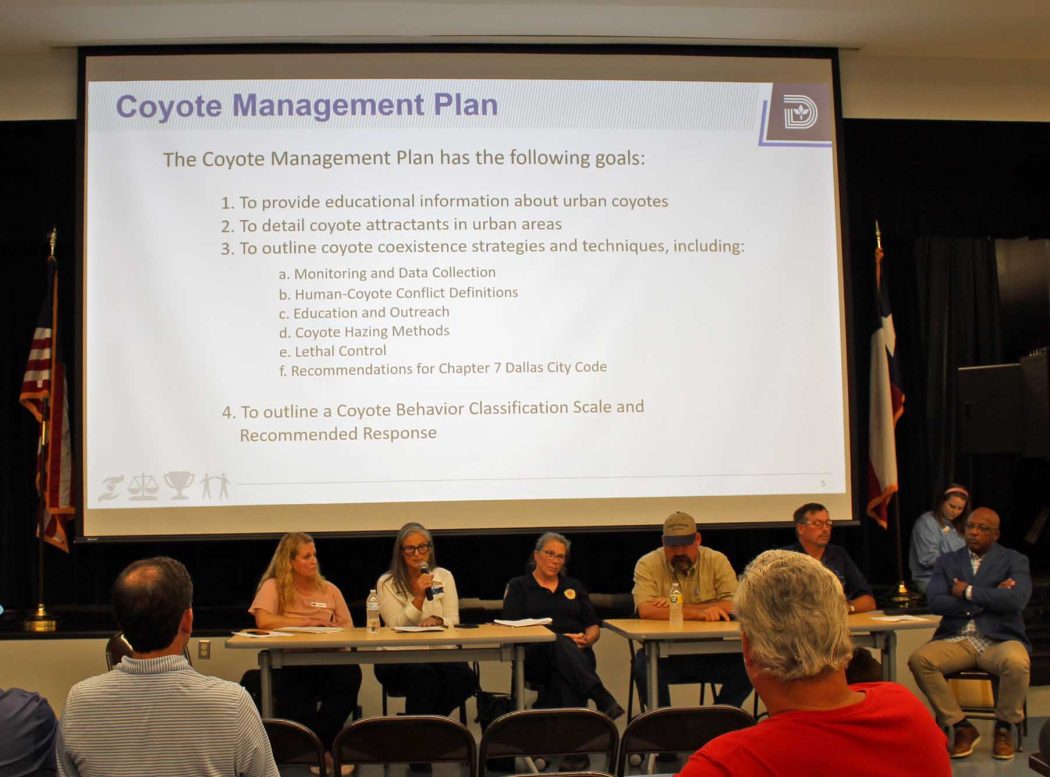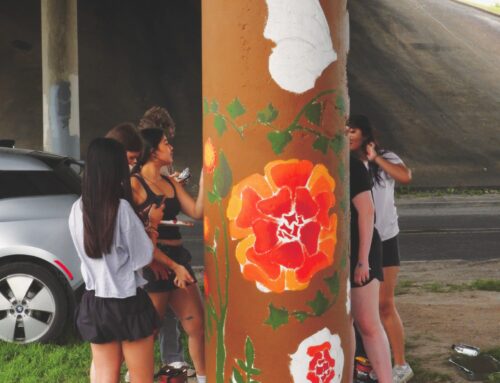Monday night’s coyote meeting at White Rock Elementary was part education, part therapy session. Federal and local wildlife specialists expressed regret at faulting neighbors for the animal’s attack on 2-year-old Knox Thomas while on his own porch and shared their new Coyote Management Plan. Residents voiced frustration at being portrayed in the national press as coyote-petting bumpkins, and they pressed for details on how an automated hotline would keep their children safe from a clear and present danger.
After the meeting, Genna Thomas took to social media to share details of the coyote’s attack on her toddler and to praise her middle son for helping to save the life of his brother.
“On Tuesday, May 3, Luke (5), Knox (2) and I were doing some chores and going to the ymca to work out. I was finishing laundry and herd the chime of our security system that the boys were opening the front door. The time stamp is 8:15 a.m. This was not unusual – we had a sand table on the porch and the boys were asking to play earlier. I grabbed Knox’s clothes to get him dressed and was headed downstairs to join them when Luke yelled from the entryway, ‘mama, Knox is being attacked.’ Because of Luke’s language (hero, and praise) I ran downstairs and out the front door to find Knox’s head and neck in a coyote’s mouth. And so much blood. I started screaming in my loudest voice and ran toward the coyote. Praise God, it dropped Knox and retreated enough for me to grab him and get inside. I immediately called 911. The time stamp is 8:17. This attack happened in seconds. The coyote continued to pace our street and yard for the next several minutes. When interviewing Luke over the phone for the police and animal control, he reported, ‘the coyote was across the street and ran to our porch, ate Knox’s shirt and pulled him down the stairs then bited him.’ This was a blatant, immediate attack by a coyote that had been reported multiple times and showing increasingly aggressive behavior. We are devastated by the events but also grateful that, although he sustained serious injuries, Knox is healing and will make a full recovery. We are in awe of our brave boy.”
“This is something you cannot even imagine happening,” Councilman Adam McGough shared at the meeting, admitting that he, like many Lake Highlands neighbors, was “pretty ignorant as to coyote issues” before the attack. He expressed disappointment at the initial response by Dallas Animal Services (DAS) and United States Department of Agriculture (USDA) reps who had been contacted by residents about aggressive coyotes but blamed petting and hand-feeding by neighbors for attracting the dangerous animal.
“There has been a breakdown,” McGough said. “I didn’t know the city didn’t have a coyote management plan. I didn’t know we needed one.” He added, “For that, I apologize.”
“DAS realizes the system we have in place for wildlife reporting needs to improve,” said MeLissa Webber, the agency’s director. “It made it difficult for residents to know who to contact and when, and for DAS to get complete information regarding coyote sightings and encounters to enable tracking and monitoring. We are committed to fixing this process to ensure we provide the service you need and to maintain community safety.”
“It was never our intent to place or deflect blame onto this community,” added Webber. “Our intent, which I know most of you share, is to prevent widespread panic about coyote attacks.”
Webber said no residents were found to be petting coyotes but said a small number of “well-meaning animal lovers” admitted to feeding wildlife or hearing that neighbors were doing so. Panelists also stressed the need to keep yards clear of food items which might attract dangerous animals, from lunch trash left by contractors to porch dinner deliveries to litter blown out of rolling bins.
“I wish that we had had this meeting a month ago so that we could have educated you, and that’s where we need to do better,” said Webber.
“We were calling in and doing what we felt was our part,” replied White Rock Valley neighbor Todd Williams. “What we respectfully say is that the systems need to be looked at. Those changes need to be made at DAS, not by the community.”
Libby Nicholson, another WRV resident, agreed.
“It’s being communicated here that (there are coyote attacks because) we planted the wrong things and there are dumpsters and construction, but we haven’t been educated about these things over the past two years. It feels insensitive right now when there’s a child who almost died, and I am so frustrated by the lack of responsibility.”
Adam Henry with USDA Wildlife Services reported that his team removed a fourth aggressive coyote this week with the distinctive white tail markings noted in last Tuesday’s attack. None of the coyotes’ tests revealed rabies or mange – good news but too late for little Knox, who already had to undergo treatment, just in case. Henry praised the new coyote hotline, which he said should alleviate some of “the community’s distrust of 311.”
“I talked to some folks who had 45 minutes to an hour to stay online to get a report to us and that’s too slow,” he said. “In an effort to create that connection between the citizenry and the governing body, we created that for y’all. We are not trying to remove all coyotes. The coyote that sees you and runs away is the coyote we want. If he’s out in the daylight, harass him and chase him out of your neighborhood as safely as you can so that we re-instill fear of humans and they’re not walking down the street while people Googles and ahhs and watches them like the unicorns they are not.”
Callers to the hotline will receive a call back in 3-5 days, said Ann Barnes, USDA field manager. Residents called that ineffective.
“Three to five days is not a hotline,” said McGough. “That is absolutely unacceptable at every level.”
“That hotline feels like a false sense of security you’re trying to give this neighborhood,” agreed Nicholson. “A lot of moms feel frustrated and scared by the situation. We’re trying to protect our children, and we don’t feel like the city has our back.”
“We knew we needed to protect our pets. What we didn’t know was we needed to protect our children,” said Kathy Stewart, LH resident. “I want to know what changed. Why did (the coyotes) go from to pets to children, and that’s your responsibility to know and your responsibility to guide us and not point fingers back at us. I’m going to ask for details on this coyote management plan. (Pointing) That’s an outline, not a plan.”
Officials indicated they’ll share more details in the coming days and weeks. They asked residents to call 911 with emergency calls about coyote attacks or immediate threats and to report other sightings to the hotline at 469-676-9813. Concerning behavior includes entering yards, porches, picnic areas or playgrounds frequented by humans; stealing food from porches; appearing injured or sick; and refusing to be scared off easily.






